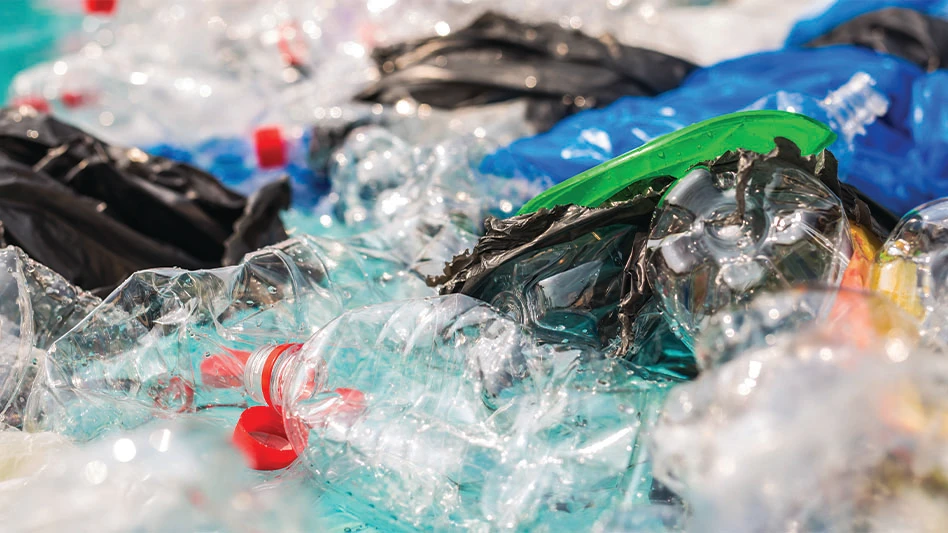
satura_ | stock.adobe.com
By 2040, virgin plastic production will increase by 60 percent, reaching 736 million tons annually (OECD).
And that is only a modest estimate. Others see plastic production tripling from its 2020 levels until 2050.
To make matters worse, not even 10 percent of plastics are recycled. The only way out of this plastic mess is a global treaty with real teeth.
While Europe recently has released the Plastics and Plastic Waste Regulation (PPWR), all eyes were on the Intergovernmental Negotiating Committee on Plastic Pollution (INC-5) meeting in Busan, South Korea, held Nov. 25-Dec. 1, with more than 3,800 representatives from over 170 nations in the final round of negotiations.

It was predictable that after the failure of the recent United Nations Climate Change Conference, or COP29, the petrochemical industry would also strongly mobilize against a robust agreement on plastic waste. German, or formerly-German, companies such as BASF and Covestro have played a particularly inglorious role by categorically opposing limits on the growth of plastic production. Yet "reduce" should be the cornerstone of all R-strategies. Instead, a lot of focus has been on recycling from the petrochemical industry, even though it is clear to everyone that the influx of more plastic into the environment cannot be solved through recycling alone.
If absolute production limits seem unrealistic given the state of negotiations (and if poorly designed, they also risk ecological mismanagement), the agreement should at least establish a framework for internalizing the environmental damage caused by virgin plastic production into the resin prices. It cannot be that the petrochemical industry profits enormously while passing the ecological costs of unchecked plastic consumption onto the public. These costs include not only significant CO2 emissions from production but also the incalculable damage to flora and fauna caused by plastic pollution. Not to mention the major elephant in the room—the public health risks of plastic entering the human bloodstream.
Another point in the discussions, minimum recycled content quotas for all plastic applications should focus clearly on product design and advanced mechanical recycling. The latter is far superior to all experimental recycling technologies in terms of ecological footprint, but has so far been treated as a niche subject. There is enormous potential for innovation and environmental protection to be unlocked here.
When polymer chains are no longer mechanically recyclable after multiple cycles, a technology-neutral debate should determine whether advanced incineration with carbon capture and utilization (CCU), carbon capture and storage (CCS) or another recycling method makes sense. However, significant doubts exist about alternative methods due to their high energy consumption and the toxic byproducts they generate.
A strong European chemical industry is crucial, but it needs an entirely new business model. If petrochemical companies are not incentivized to adopt ecologically sustainable carbon cycling, we are almost certain to face technological missteps, poorly disguised under the narrative of "technological neutrality." Physics doesn’t lie.
Lastly, plastic must not be demonized in its entirety, but rather seen for what it is: an incredibly versatile material that plays a central role in technological progress across many sectors and can significantly contribute to prevent and adapt to climate change. However, addressing the waste problem with greater urgency and without ideological bias is imperative, going beyond the shareholder interests of the petrochemical industry.
We should ask ourselves how we would structure the value chain today if we were starting from scratch, rather than how we can preserve linear industries to extract as much profit as possible from their environmentally harmful, outdated infrastructure. In Germany, we need to clean up our own house before pointing fingers at other nations. However, the National Circular Economy Strategy (NKWS) in Germany and the EU’s PPWR demonstrated that real change is possible when approached with serious commitment.
Christian Schiller is the founder and CEO of Cirplus GmbH, a digital procurement platform for recycled plastics based in Hamburg, Germany. To learn more, visit www.cirplus.com.
Latest from Recycling Today
- Orion ramping up Rocky Mountain Steel rail line
- Proposed bill would provide ‘regulatory clarity’ for chemical recycling
- Alberta Ag-Plastic pilot program continues, expands with renewed funding
- ReMA urges open intra-North American scrap trade
- Axium awarded by regional organization
- Update: China to introduce steel export quotas
- Thyssenkrupp idles capacity in Europe
- Phoenix Technologies closes Ohio rPET facility





